

Every Google Search Operator You’ll Ever Need — EMA Boston. I consider myself a bit of a Boolean geek.

I fell in love with Boolean search in college, but it wasn’t until I got hold of Lexis-Nexis after college that I realized the power of search. When Google came around many moons later, I was disappointed that I couldn’t use the same Boolean operators that I could elsewhere — Google wants the experience to be as simple as possible, and, let’s face it, Boolean search strings can be pretty overwhelming.
Get Better Results From Your Searches. How to Search Twitter Like a Superstar [The Free Guide] Every second, on average, around 6,000 tweets are sent on Twitter, which translates to over 500 million tweets per day!
![How to Search Twitter Like a Superstar [The Free Guide]](http://cdn.pearltrees.com/s/pic/th/search-twitter-superstar-guide-144657775)
Did you know you could search every single one of them? (Plus the multi-million profiles attached to them!). Twitter has an amazing, yet somewhat little-known Twitter Advanced Search tool to help you find exactly what we’re looking for. 10 Important Google Search Strategies. How To Extract Google Results Into a Spreadsheet. 6 common misconceptions when doing advanced Google Searching. As librarians we are often called upon to teach not just library databases but also Google and Google Scholar.
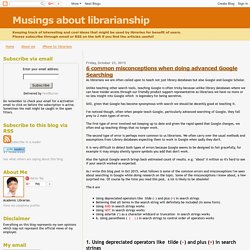
Unlike teaching other search tools, teaching Google is often tricky because unlike library databases where we can have insider access through our friendly product support representative as librarians we have no more or no less insight into Google which is legendary for being secretive. Still, given that Google has become synonymous with search we should be decently good at teaching it. I've noticed though, often when people teach Google, particularly advanced searching of Google, they fall prey to 2 main types of errors. The first type of error involved not keeping up to date and given the rapid speed that Google changes, we often end up teaching things that no longer work.
Open University Library Services. When you select a pathway, you will see a number of activities on a particular theme.
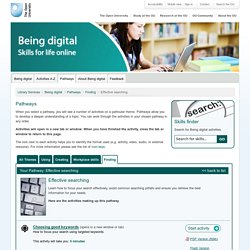
Pathways allow you to develop a deeper understanding of a topic. You can work through the activities in your chosen pathway in any order. Activities will open in a new tab or window. When you have finished the activity, close the tab or window to return to this page. The icon next to each activity helps you to identify the format used (e.g. activity, video, audio, or external resource).
Viewing all pathways This is a list of all the pathways available. Assess your skills Assess your familiarity and confidence with online tools and environments and find out which activities can help you develop your skills further. Start pathway Avoiding plagiarism Learn to recognise what plagiarism is, the forms it can take and how to avoid it by developing your skills.
Notions de base des recherches. How to search like a spy: Google's secret hacks revealed. The National Security Agency just declassified a hefty 643-page research manual called Untangling the Web: A Guide to Internet Research (PDF) that, at least at first, doesn't appear all that interesting.
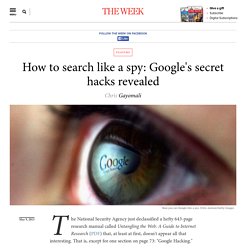
That is, except for one section on page 73: "Google Hacking. " "Say you're a cyberspy for the NSA and you want sensitive inside information on companies in South Africa," explains Kim Zetter at Wired. Verification Handbook for Investigative Reporting. Craig Silverman is the founder of Emergent, a real-time rumor tracker and debunker.
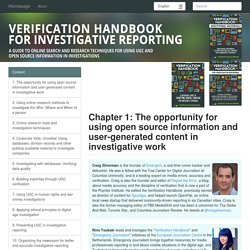
He was a fellow with the Tow Center for Digital Journalism at Columbia University, and is a leading expert on media errors, accuracy and verification. Craig is also the founder and editor of Regret the Error, a blog about media accuracy and the discipline of verification that is now a part of the Poynter Institute. He edited the Verification Handbook, previously served as director of content for Spundge, and helped launch OpenFile, an online local news startup that delivered community-driven reporting in six Canadian cities. Craig is also the former managing editor of PBS MediaShift and has been a columnist for The Globe And Mail, Toronto Star, and Columbia Journalism Review. He tweets at @craigsilverman.
Rina Tsubaki leads and manages the "Verification Handbook" and "Emergency Journalism" initiatives at the European Journalism Centre in the Netherlands. 11 Unknown Ways Of Using Google Search - Curious Mob. Thinking what more is there to know about Google search?
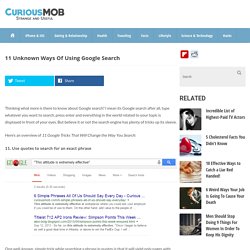
I mean its Google search after all, type whatever you want to search, press enter and everything in the world related to your topic is displayed in front of your eyes. Search Shark. Online Search Tools - Deep Web Search. Deep Web Research 2012. Bots, Blogs and News Aggregators ( is a keynote presentation that I have been delivering over the last several years, and much of my information comes from the extensive research that I have completed over the years into the "invisible" or what I like to call the "deep" web.

The Deep Web covers somewhere in the vicinity of 1 trillion plus pages of information located through the world wide web in various files and formats that the current search engines on the Internet either cannot find or have difficulty accessing. The current search engines find hundreds of billions of pages at the present time of this writing. In the last several years, some of the more comprehensive search engines have written algorithms to search the deeper portions of the world wide web by attempting to find files such as .pdf, .doc, .xls, ppt, .ps. and others. This Deep Web Research 2012 report and guide is divided into the following sections: 99 Resources to Research & Mine the Invisible Web by Jessica Hupp. Researching Your Family Tree: An Introduction to Genealogy. Google Chrome Tips. Google Search - Collections - Google+ NLJ. Businessinsider.
NLJ. CIL-super-searcher.pdf. 50+ Ways to Search Twitter. Web Search Help. Skills for Online Searching - ipl2 A+ Research & Writing. Learn how search syntax works Search syntax is a set of rules describing how users can query the database being searched.

Sophisticated syntax makes for a better search, one where the items retrieved are mostly relevant to the searcher's need and important items are not missed. It allows a user to look for combinations of terms, exclude other terms, look for various forms of a word, include synonyms, search for phrases rather than single words. The main tools of search syntax are these: Boolean logic Boolean logic allows the use of AND, OR and NOT to search for items containing both terms, either term, or a term only if not accompanied by another term. Wildcards and truncation This involves substituting symbols for certain letters of a word so that the search engine will retrieve items with any letter in that spot in the word. Finding Information on the Internet: Table of Contents.
Choose the Best Search for Your Information Need. Live Training – Search Education – Google. Grey Literature Strategies. The Professional's Guide to Advanced Search Operators.